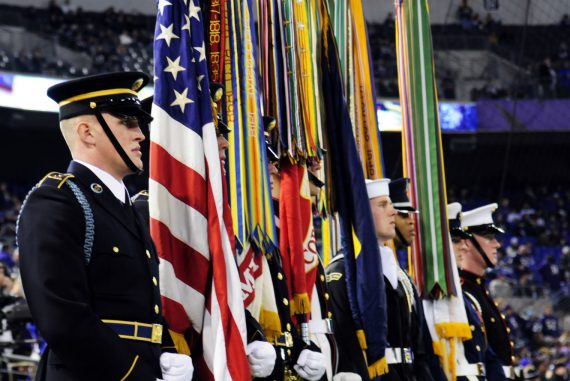The Dangers of Relying on Airpower Alone
My latest for War on The Rocks, "The Inter-Service Wars Are Looking Like Calvinball," has posted.
My latest for War on The Rocks, “The Inter-Service Wars Are Looking Like Calvinball,” has posted. It’s a response to an earlier WOTR essay, ”Airpower May Not Win Wars, But It Sure Doesn’t Lose Them,” and rather defies excerpting. The core argument:
The United States should stop fighting unwinnable wars, whether by land, sea, or air. Alas, given that its political leadership has repeatedly ignored that advice, it would be foolish to make force planning decisions based on a fantasy alternate reality. As a wise man once noted, “You go to war with the army you have, not the army you might want or wish to have at a later time.”
[…]
Given limited resources, a rising China, a resurgent Russia, and a weariness around counterterrorism and counterinsurgency operations, [radically cutting the Army and Marine Corps and investing in the Air Force and Navy] is arguably a sound policy. If, as Pietrucha and Renken suggest, we can simply rely on being “isolated by two great oceans,” accept “limited objectives,” and stop expecting ”decisive conclusion[s]” to our disputes with other countries, it’s certainly the right call.
Yet history shows that this can never remain American policy for long. We are, as the historian Geoffrey Perret dubbed us more than a quarter century ago, “A Country Made by War.” Indeed, we’ve fought an awful lot of them since. While even sequestration-sized Army and Marine Corps would be more than adequate for any deterrent mission plus various special operations, humanitarian relief missions, and other small deployments, they’d be woefully inadequate for a re-run of the last decade.
While the obvious solution is the one stated at the outset — avoid such a re-run — a global superpower never runs out of challenges to its perceived interests. Recall that the man who led us into Iraq campaigned on a “humble foreign policy” that eschewed “nation-building.”
Much more at the link.







‘Twas always thus, going back to Billy Mitchell’s fraudulent battleship bombing “test”. Happened to re-read the chapter on planning in Max Hasting’s Overlord a couple days ago. The bomber generals resisted supporting the invasion of France, regarding it as a diversion from winning the war by bombing. (Politically, they were correct. Had we not invaded, they would have kept bombing, the millions of Russian boots on the ground would still have defeated Germany, and the bomber generals would have claimed credit.)
As you say, “Pietrucha and Renken rightly note that the dropping of two atomic bombs was the decisive blow in the Pacific theater in World War II and claim this “settled that airpower could end wars.”” Did they discuss how we managed to get runways and massive logistics support within B-29 range of Japan?
@gVOR08: Billy Mitchell was the first guy who popped into my head. Nearly 100 years later, his way of thinking is still prominent in the Air Force, as you can see.
As a 20-year USAF veteran, I’d like to be able to agree that airpower alone can win wars, but I can’t. James is right.
The most successful war that the US ever achieved was the Cold War which resulted in the collapse of the enemy and a rolling back of the opponent’s borders to positions not seen in centuries; Russia’s territory is smaller today than under Catherine the Great. In shooting wars, our record in the last seventy years has not been so great with Korea, Vietnam, Afghanistan, and Iraq being at best unsatisfactory.
We need fewer bombers and more diplomats if we want victories. Let Putin walk around with his shirt off being all macho; we should adopt strategies that actually win.
In many uses of force in which we do not have vital interests, the only way to win is not to play.
@Slugger: Agreed ; we could save a lot of money if we simply did away with the Air force altogether. The long range bomber is a dinosaur and carrier based fighters from the Navy are doing most of the fighting anyway. The Air Force Academy has been taken over by Evangelical Christians.
@Slugger:
Unfortunately too many Americans want the macho, strutting guy.
I lean slightly to the Air/Naval pre-eminence side. With the advent of precision guided ordinance the wasting of aircrew and aircraft that characterized Rolling Thunder (in which numerous missions were used to destroy targets such as bridges which were rebuilt overnight) seems to be one of those historical atrocities that future generations will marvel at.
The Patruchka/Renken article’s version of the Pacific theater in WW2 points out correctly that the ground fighting there was mostly in support of airpower; the ground forces were used to deny airbases to the Japanese or to seize airbases for our use. (I note they conveniently leave much of NewGuinea and Philippines out of that discussion but those were mostly Army campaigns AFAIK.) I believe that future warfare is much more likely to resemble that fighting than, for example, Stalingrad or Kurst.
Principally my thought is based on the adage that if one has a hammer every problem becomes a nail. In the absence of a military based on repulsing the Red Army from Europe, our Iraq and Afghan adventures would have been much smaller if they were conducted at all.
Or so it seems to someone who made it all the way to E-4 buck sgt status but has read and studied obsessively on the topic for many years.
A footnote: Criticism of the F-35 and Ford aircraft carrier are right on the mark and advocating for the Warthog wins Dr Joyner a major upvote from me.
Sure, we’ve fought an awful lot. But how many have we actually won? When, in fact, is the last time that the US won a clear-cut victory against an evenly matched opponent? (Or even a much weaker opponent?) The victory over Japan in 1945?
We have an extremely expensive, extremely well-equipped military that keeps failing. It seems to me the problem is at the political level in failing to define achievable goals, and at the level of generalship.
I don’t think our generals are very good. I’m not quite sure why we tolerate generals who despite having the best-equipped and most extensively-trained forces, keep managing to lose to what are basically hillbillies with AK-47s.
What evidence is there that despite all the money spent we have the first idea what the hell we’re doing militarily? How about before we squabble over new toys we see if we can do something about an officer class that cannot manage – with a 10 to 1 superiority over every opponent since the signing on the battleship Missouri – to actually win?
@michael reynolds: That’s pretty much the theme of Thomas Ricks’ The Generals. In WWII our Army replaced generals routinely. Generally in such a way as to not destroy their careers. There were guys removed from a combat command, given a stateside command for awhile, and then successful in another combat command. Now we rotate commanders regularly so that a) by the time a guy figures out what he’s doing, he’s leaving, and b) he’ll be rotated out in a few months anyway, so no point to replacing him now, it’d just look bad on his record.
I haven’t had any respect for our great General Petraeus since I read his book. His wonderful counterinsurgency manual was a load of philosophy and pop sociology with a dearth of practical advice. If anything it proved we have no idea how to fight an insurgency.
@michael reynolds:
We’re not losing to those guys, we’re killing them wholesale and winning battles. But even winning 100% of small-unit engagements doesn’t translate into winning the overall war, as our sad experience in Afghanistan indicates. Winning a war requires one of two conditions: either the enemy capitulates and accepts defeat, or the enemy is 100% dead.
I am sure to be stating the obvious when saying neither is likely in Afghanistan.
@Mikey: I liked somebody’s line that Taliban is a life style, not an organization. It’s like invading Georgia to defeat the rednecks. Right off the top, who signs a surrender document binding on them?
@Rafer Janders:
The Cold War was won pretty decisively with the fall of the Soviet Union and the roll back of it’s boarders in the 80s. The messes in Georgia and Ukraine are only a small push back after that devastating loss. That was mainly an economic and diplomatic war with proxy wars around the world, but we did win.
@gVOR08:
Yeah, I read the Ricks book which I found revealing in a sad way. But what a great antidote to the inevitable, “Just listen to the generals” cant one gets at times.
The American military is a tool and a damn good one. Across the board we have the best with other allied countries having individual specialties that exceed ours. The problem is with the Civilian leadership that gives the military their marching orders. They actually micromanage many of the details of campaigns thinking that “political”, limited wars can actually achieve victory. Victory is showing that they are not. I think the lesson learned is: If you aren’t willing to wage total or near total war then the Military is probably not the right tool to use from the nation’s toolbox. A real hearts and minds campaign is not in messaging….frankly, it is destroying it–leading it for 30-35 years and shaping it the way you want. See Japan/German. That is not to say that’s what we should have done in the Middle East. That is to say though, if you are going to rent some company for the evening and only want to get half undressed…..its better you didn’t rent the company at all.
@Grewgills:
Um, no, besides the point — or rather, makes my point in the opposite direction. The most significant American victory of the last two generations was the Cold War — and that was largely won on economic, political and moral grounds. When it comes to fighting actual shooting wars, on the other hand, we have a pretty poor record of success, with most engagements since WWII going down in either the loss or, at best, the tie column. Having a peerless military is not worth as much as we may think it is if that military can never actually prevail in a conflict.
@Mikey: “We’re not losing to those guys, we’re killing them wholesale and winning battles. But even winning 100% of small-unit engagements doesn’t translate into winning the overall war, as our sad experience in Afghanistan indicates. Winning a war requires one of two conditions: either the enemy capitulates and accepts defeat, or the enemy is 100% dead.”
This is the point, that we *are* losing to those guys. We’re just pointing to our metrics and saying that we won on points.
@Mikey: “…and winning battles. ”
Classic saying from Viet Nam:
‘We won all of the battles.’
‘True, but irrelevant.’